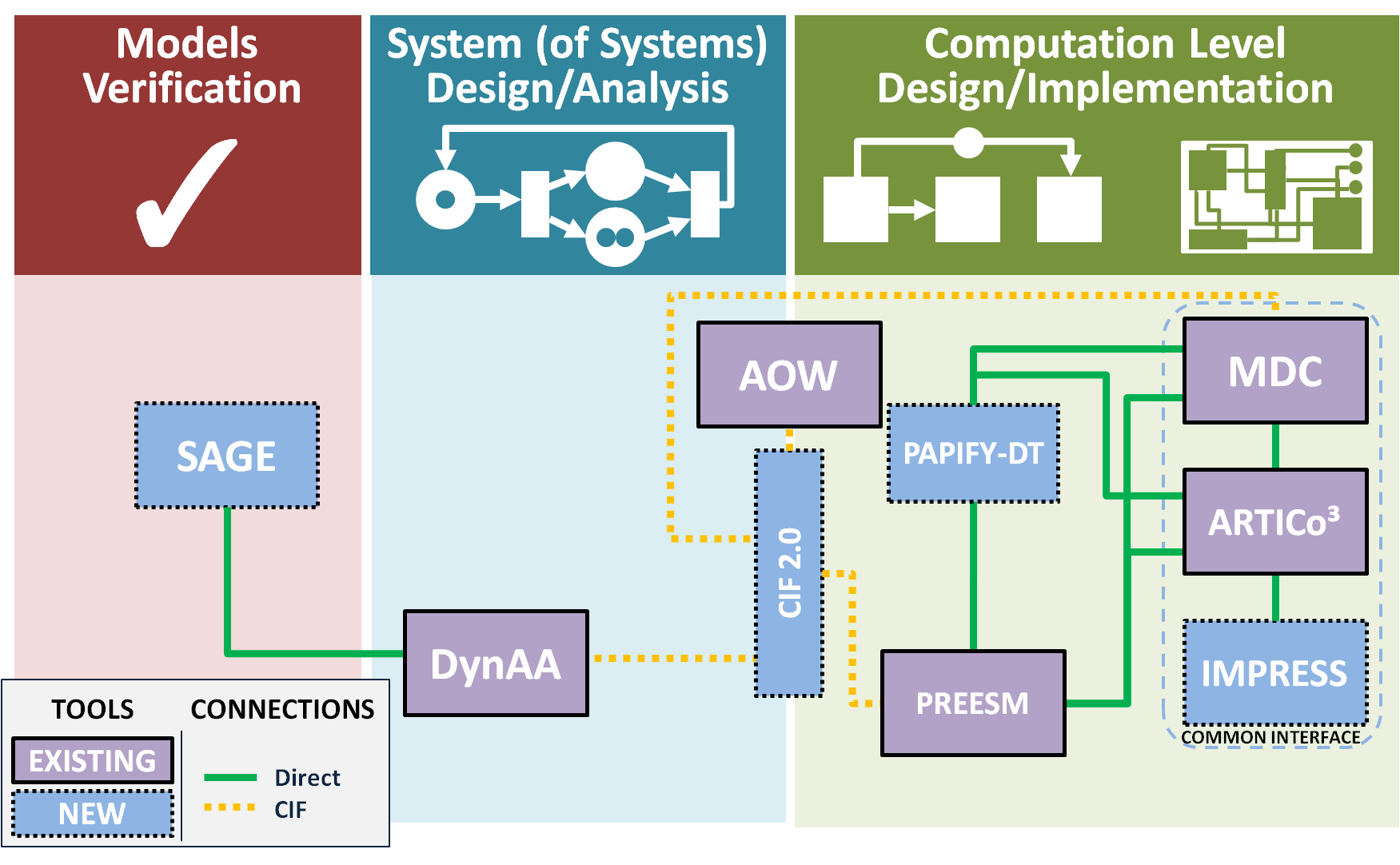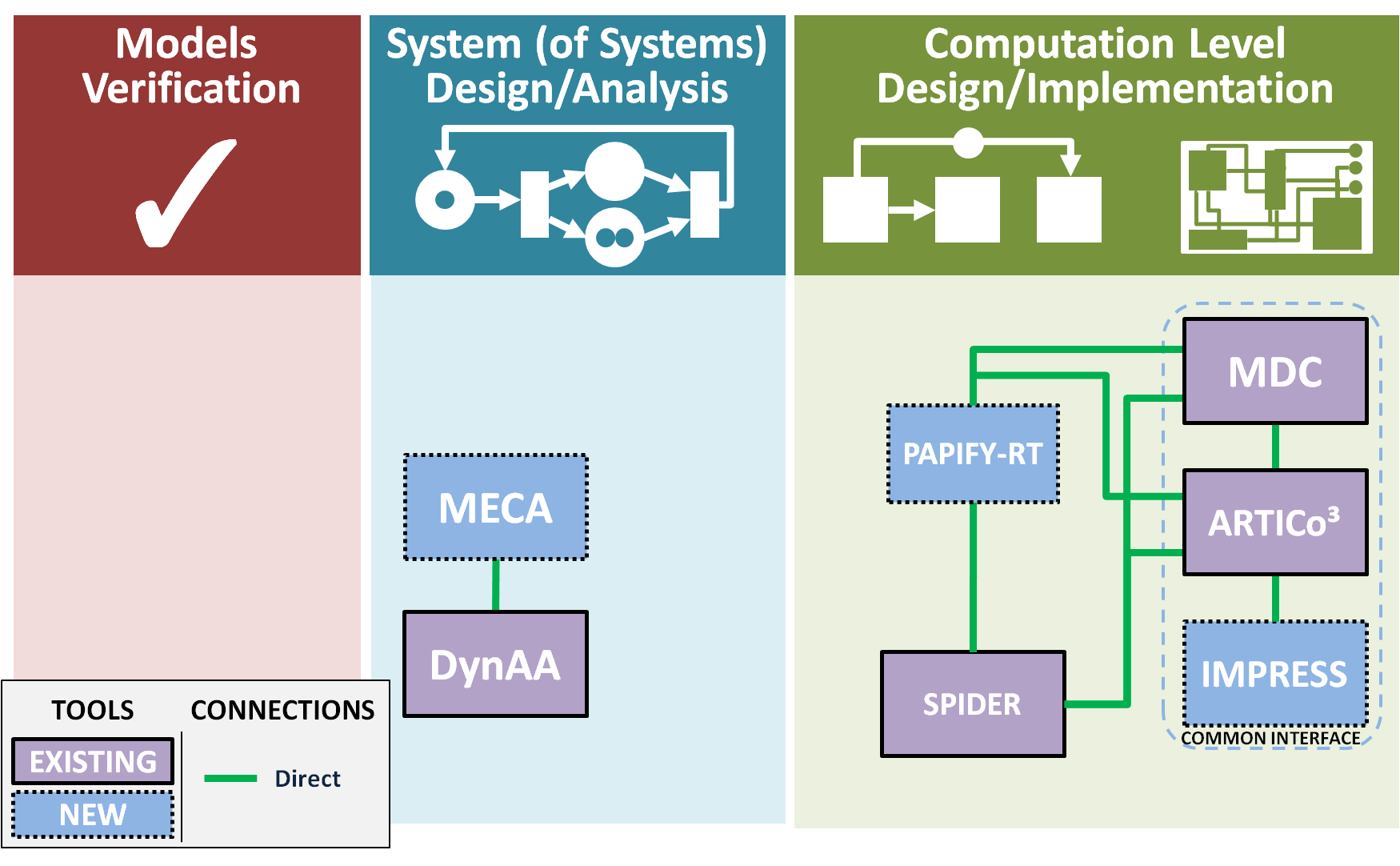CERBERO Toolchain
The CERBERO Toolchain
To support the design and management of self-adaptive CPS, CERBERO offers a toolchain that operates at different levels of abstraction, from the computation level to the System level, delivering also user-level features (i.e. requirements and model verification). CERBERO tools offer support at design-time, for the design, verification and deployment of self-adaptive CPS, and at run-time for providing self-aware smart system management.
In order to ease the integration of different tools in a unique toolchain, CERBERO also provides the CERBERO Interoperability Framework (CIF), which enables the integration of some of developed tools.
| Design–Time Support | Run-Time Support |
|---|---|
 |
 |
Tools
| Name | Support | Description |
|---|---|---|
| SAGE | Design-Time | The SAGE Verification Suite leverages on formal methods and provides two tools; ReqV, to automatically check consistency of a set of requirements provided by the user and Hydra, to perform automated synthesis of high-level policies. |
| DynAA | Design-Time Run-Time |
Dynaa is based on discrete-component models to find optimal solutions by means of model simulations. At run-time, Dynaa can be used to explore different solutions, interacting with signals that come from the system and the environment. |
| MECA | Run-Time | MECA improves the resilience of human-machine teams by providing system, environmental and human monitoring and diagnosis, and high-level decision support in cases of unforeseen conditions and events. |
| AOW | Design-Time | AOW works at system level to solve large scale hybrid optimization problems to return frontier of Pareto optimal solutions. |
| PREESM | Design-Time | PREESM enables parallel-application development with design-time prediction, as well as code generation and re-use capabilities. |
| SPIDER | Run-Time | SPIDER performs dynamic mapping and scheduling of reconfigurable dataflow applications on parallel heterogeneous architectures. |
| PAPIFY | Design-Time Run-Time |
PAPIFY provides monitoring capabilities by means of an event library aimed at generalizing the Performance API (PAPI) for heterogeneous architectures. At run-time, PAPIFY provides a large set of execution monitors to enrich SPIDER scheduling. |
| MDC | Design-Time Run-Time |
MDC tool is an automated dataflow-to-hardware framework for the generation and system integration of CGR accelerators. |
| ARTICo3 | Design-Time Run-Time |
ARTICo3 exploits a DPR-enabled multi-accelerator computing scheme, to provide scalable parallelism. It also provides an automated toolchain to go from the user-defined application down to the system implementation. |
| IMPRESS | Design-Time Run-Time |
JIT hardware composition refers to the ability to implement, at run-time, hardware accelerators on FPGAs without a presynthesized design. IMPRESS, belonging to the JIT HW design suite, is a TCL script-based tool for the automated generation of relocatable partial bitstreams under Vivado. |
| CIF | Design-Time | The CERBERO Interoperability Framework (CIF) leverages on a simplified ontology-based data integration approach to combine data or information from multiple heterogeneous sources. The main goal behind CIF is to enable interoperability between computing services/processing entities in an efficient and transparent way. |

 © 2017 CERBERO | All Rights Reserved |
Project ID: 732105,
Funded under: H2020-EU.2.1.1. - INDUSTRIAL LEADERSHIP - Leadership in enabling and industrial technologies - Information and Communication Technologies (ICT).
© 2017 CERBERO | All Rights Reserved |
Project ID: 732105,
Funded under: H2020-EU.2.1.1. - INDUSTRIAL LEADERSHIP - Leadership in enabling and industrial technologies - Information and Communication Technologies (ICT).